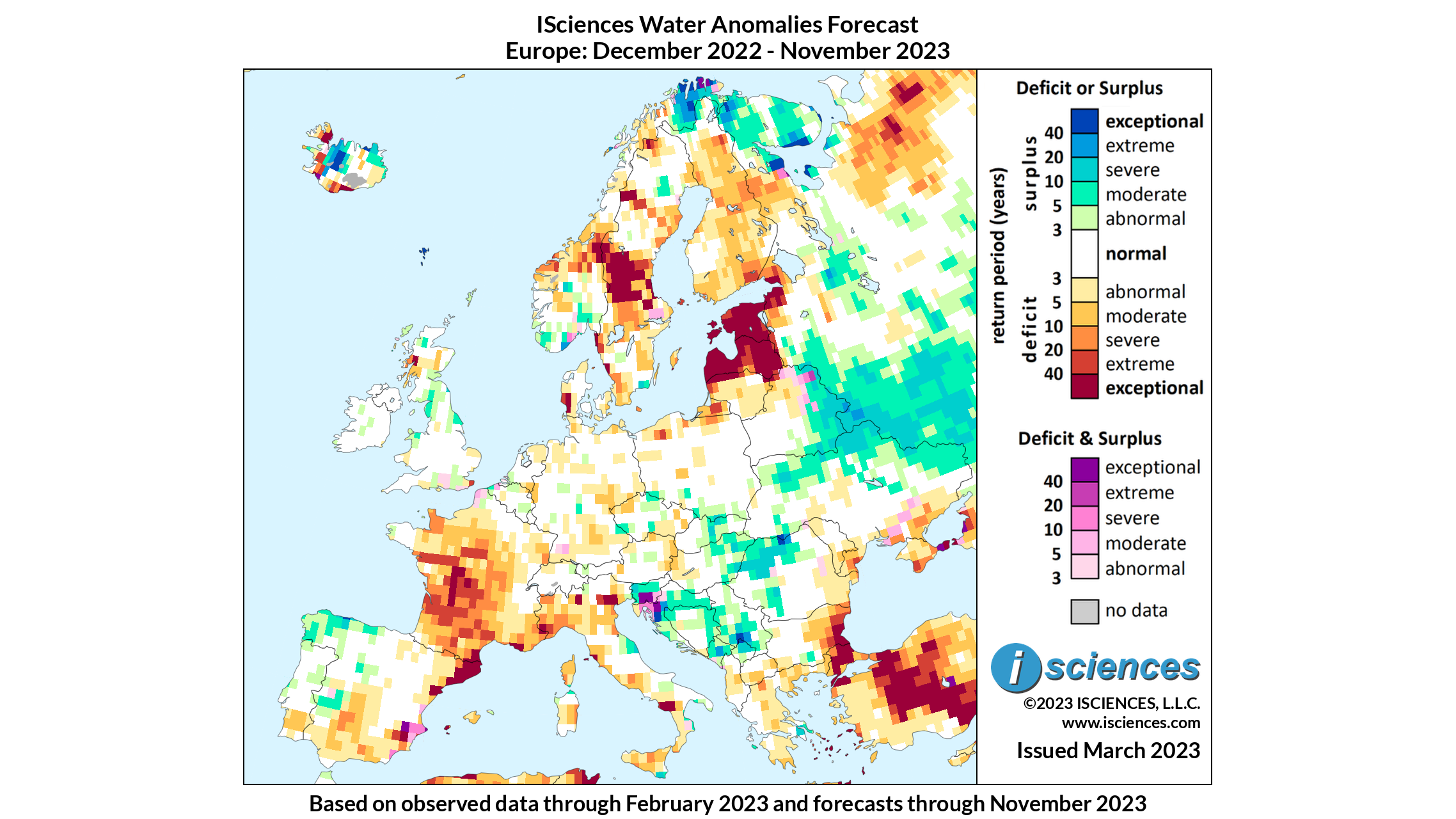Europe: Water deficits in Continental Europe to persist
28 March 2023
THE BIG PICTURE
The 12-month forecast ending in November 2023 indicates widespread deficits across Continental Europe with varying degrees of intensity, while the United Kingdom and Ireland are expected to experience mostly normal conditions.
Areas experiencing extreme to exceptional deficits include:
France, widespread throughout the country.
Eastern Bulgaria, in regions along the coast of the Black Sea.
The Baltics, widespread throughout Latvia and Estonia.
Northeastern Spain, in the eastern coastal regions of Catalonia.
Central Sweden, primarily in Dalarna and southern Jamtland counties.
Moderate to severe deficits are expected in:
Southern Spain, with mild to moderate deficits throughout the southern Andalucia region.
Finland, spanning much of the country.
Northern Italy, spreading from the city of Turin to Venice. Similar deficits will persist along the country’s western coast.
Southern Sweden, near Gothenburg, then spreading further south along the coast.
Moderate to severe surpluses are expected in:
Southernmost Serbia, along its shared border with the northernmost area of Kosovo.
Throughout Croatia.
Northern Ukraine, along the country’s northern border.
Northeast Romania, northeast of the city of Cluj-Napoca.
Northern Sweden, near the Kiruna Municipality.
The 3-month maps (below) show the evolving conditions in more detail.
FORECAST BREAKDOWN
The forecast through May 2023 predicts severe to exceptional deficits in central France, central Sweden, and throughout the Balkans. Pockets across northern Italy and northeastern Spain can expect deficits of similar intensity. In the Arctic Norway, eastern Belarus, northern Romania, and northern Ukraine, severe to extreme surpluses are expected to emerge.
From June through August 2023, most of the exceptional deficits in Continental Europe are expected to subside to moderate to severe deficits, though exceptional deficits in the Baltics and central Sweden are expected to endure. Regions with a forecast of deficit include France, eastern Bulgaria, southern Germany, and pockets throughout northwestern Italy. Surpluses, primarily moderate, are expected to occur in Arctic Norway.
The forecast for the final months – September through November 2023 – anticipates mostly normal conditions to mild deficits across Continental Europe, with intense deficits in central Sweden, Finland, and the Baltics. The United Kingdom and Ireland can anticipate similarly normal conditions. Please note that WSIM forecast skill declines with longer lead times.
IMPACTS
As of March 1, citizens of four French departments, Ain, Isère, Bouches-du-Rhône and the Pyrénées-Orientales, have been instructed to restrict their use of water to conserve resources during the country’s historic drought. Citizens are forbidden to water their lawns, fill their swimming pools, and prohibited from irrigating crops in an effort to conserve water during the country’s historic drought. Some authorities have banned new houses from being built for the next four years due to the strain it would put on water supplies, even though France is facing a housing crisis. On March 6th, Ecological Transition Minister Christophe Béchu called on authorities of France’s seven major river basins to issue similar restrictions, as he expects the number of departments affected by drought to grow.
Carmelo Cammalleri of the Polytechnic University of Milan estimates that reservoirs in France and northern Italy are about 40 to 50 percent lower than normal. The longest river in Italy, the Po, is reportedly 60 percent below its normal levels, and snow on the Alps has been documented to be roughly half of what it's usually expected this year.
Italy’s rice production is expected to decrease in 2023 as farmers endure a second year of drought. The amount of land used for farming has been reduced to the lowest level for more than two decades. Roberto Magnaghi, director general of Ente Nazionale Risi, expects no more than 211,000 hectares will be sown with rice in 2023, which is the smallest amount of land for 23 years. "Water is scarce. We are all looking up at the sky," he said. The 2023 estimate is down by 7,400 hectares from 2022 and by 16,000 compared to 2021. Italy’s rice farmers harvest about 50% of the rice produced in the European Union and is the world's only grower of types most suitable for risotto such as Arborio and Carnaroli.
Olive oil production in Spain is expected to be similarly affected by drought, reducing supply and consequently making prices rise. The country’s output of olive oil is expected to be cut by 50% compared to the previous year, estimated by officials from the European Commission. Spain usually supplies about 40% of the world's output of olive oil. Anticipated shortages are due to heatwaves and a severe drought which impacted olive trees that flowered last spring, shrinking stocks in both Spain and Portugal. In Spain, the price of olive oil bottles had already risen by around 60% in 2022, but soaring inflation, expensive fertilizers, and drought continue to push prices upwards. A liter of virgin olive oil is currently sold in Spain for over 7 euros ($7.51), when in February 2022 the price was below 5 euros.
NOTE ON ADMINISTRATIVE BOUNDARIES
There are numerous regions around the world where country borders are contested. ISciences depicts country boundaries on these maps solely to provide some geographic context. The boundaries are nominal, not legal, descriptions of each entity. The use of these boundaries does not imply any judgement on the legal status of any territory, or any endorsement or acceptance of disputed boundaries on the part of ISciences or our data providers.
Subscribe to our monthly Water Watch List
Search blog categories
- *Precip/Temp Outlooks 101
- *Press Releases 1
- *Special Topics 18
- *Water Watch Lists 117
- Africa 127
- Australia & New Zealand 111
- Canada 113
- Central Asia & Russia 110
- East Asia 111
- Europe 118
- Mexico & C. Amer. & Carib 115
- Middle East 120
- South America 126
- South Asia 117
- Southeast Asia & Pacific 119
- United States 117
Search blog tags



